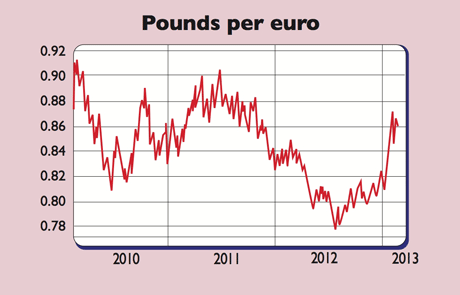Get the latest financial news, insights and expert analysis from our award-winning MoneyWeek team, to help you understand what really matters when it comes to your finances.
You are now subscribed
Your newsletter sign-up was successful
Want to add more newsletters?

Twice daily
MoneyWeek
Get the latest financial news, insights and expert analysis from our award-winning MoneyWeek team, to help you understand what really matters when it comes to your finances.

Four times a week
Look After My Bills
Sign up to our free money-saving newsletter, filled with the latest news and expert advice to help you find the best tips and deals for managing your bills. Start saving today!
The tanking yen has dominated the headlines in the forex market this year. But sterling is 2013's second-worst performing currency, and is now at a 15-month low against the euro and a seven-month trough against the dollar.
The trend looks far from over. Hedge funds, having made a killing shorting the yen, are now eyeing up sterling. US futures traders were net long sterling a month ago. Now the pound is the second most shorted currency after Japan's.
You can see why "investors are struggling to have faith in sterling", says Simon Smith of Fxpro.com. The economy is at risk of a triple-dip recession, and poor growth has undermined credibility in the government's plan to get its debt pile under control, threatening the triple-A credit rating.
MoneyWeek
Subscribe to MoneyWeek today and get your first six magazine issues absolutely FREE

Sign up to Money Morning
Don't miss the latest investment and personal finances news, market analysis, plus money-saving tips with our free twice-daily newsletter
Don't miss the latest investment and personal finances news, market analysis, plus money-saving tips with our free twice-daily newsletter
Meanwhile, the real yields on British assets look set to become even less appealing now that the Bank of England has seemingly "turned its back" on its 2% inflation target, adds Smith.

Not that it's been any good at sticking to the target anyway: for most of the past five years, inflation has been above 2%. The line has always been that, over the next two years, inflation will fall back to target. Now the Bank says it is likely to stay above target for the entire two-year forecast period. "This is part of a regime called flexible inflation targeting', which, loosely translated, means missing the target," says Buttonwood on Economist.com.
Meanwhile, recent remarks by the incoming governor, Mark Carney, suggest that he is more dovish than Mervyn King, and "may be more aggressive in his embrace of more expansionary policy, even if it risks inflation staying higher for longer", says Roger Bootle of Capital Economics in The Daily Telegraph.
The upshot? Bond markets are already pencilling in annual inflation of over 3.2% over the next decade, says Sam Jones in the FT. This is the highest expected inflation among the major economies.
Most of these reasons to be bearish on sterling, however, aren't exactly new, as Larry Elliott points out in The Guardian. But with worries over China's hard landing, America's fiscal stand-off and the collapse of the euro receding, there is less reason to mark down other currencies and the negative factors affecting sterling have come to the fore.
"That makes the pound a big sell." Sterling, agrees UBS's Mansoor Mohi-Uddin, is in danger of suffering the currency market's "next large-scale devaluation".
Get the latest financial news, insights and expert analysis from our award-winning MoneyWeek team, to help you understand what really matters when it comes to your finances.
MoneyWeek is written by a team of experienced and award-winning journalists, plus expert columnists. As well as daily digital news and features, MoneyWeek also publishes a weekly magazine, covering investing and personal finance. From share tips, pensions, gold to practical investment tips - we provide a round-up to help you make money and keep it.
-
 Can mining stocks deliver golden gains?
Can mining stocks deliver golden gains?With gold and silver prices having outperformed the stock markets last year, mining stocks can be an effective, if volatile, means of gaining exposure
-
 8 ways the ‘sandwich generation’ can protect wealth
8 ways the ‘sandwich generation’ can protect wealthPeople squeezed between caring for ageing parents and adult children or younger grandchildren – known as the ‘sandwich generation’ – are at risk of neglecting their own financial planning. Here’s how to protect yourself and your loved ones’ wealth.

